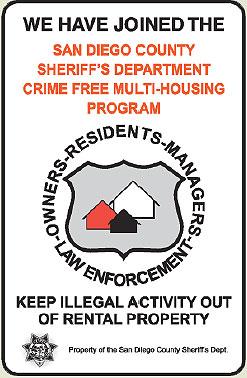 By David R. Shorey, East County Program Manager, Institute for Public Strategies
By David R. Shorey, East County Program Manager, Institute for Public Strategies
Photo courtesy San Diego County Sheriff’s Department website, other photos via Creative Commons
July 10, 2019 (San Diego’s East County) -- Imagine you lived in an apartment complex so riddled with crime and danger, that law enforcement officers would not enter the property until backup arrived. A place where firefighters would not respond to a fire unless they were accompanied by sheriff’s deputies for protection. Where helicopters frequently flew overhead in search of a suspect, or attempting to restore peace. Where drive-by shootings, vandalism, prostitution, thefts, drug dealing, gangs and violence ruled the day.
You don’t have to imagine it. That’s what it was really like at a notorious apartment complex in Spring Valley not too long ago. Then came Crime Free Multi-Housing (CFMH).
The concept of the CFMH program embraces a teamwork approach to crime prevention and is comprised of a unique partnership of law enforcement agencies, rental property owners, managers and tenants. Through a voluntary, solution-oriented training and certification program, this team collectively works to keep illegal activity out of rental property.
 Law enforcement cannot solve crime problems alone. Rental property tenants need help keeping crime at bay. Apartment community management has to play its part.
Law enforcement cannot solve crime problems alone. Rental property tenants need help keeping crime at bay. Apartment community management has to play its part.
Three-Step Process
The CFMH program consists of three parts. The first is a daylong training that provides property owners and managers the resources and programs available to them to reduce crime on their properties.
The second is a physical inspection using Crime Prevention Through Environmental Design (CPTED) principles of multi-residential properties to identify changes that can be made to a property to reduce the opportunity for criminal activity to occur.
The third is direct resident engagement to provide them the resources to work collectively as eyes and ears to supplement the property managers and owner’s crime prevention efforts.
The concept is fairly simple. Keep shrubs and greenery trimmed. Make sure there’s enough lighting in the parking lots and common areas. Make sure door and window locks work properly. Do proper background checks of potential tenants. Have a strict lease and hold tenants accountable.
Additionally the local law enforcement agency provides signs, certificates, and advertising to make it visible that the property is a certified Crime Free Multi-Housing community.
 Team Approach
Team Approach
That’s just the beginning. There also has to be buy-in by the residents, property management, ownership and law enforcement. All parties working together ensure a successful program that can easily be re-certified annually.
Traditionally, there are three ways criminal activity can infiltrate an apartment community. The criminal lives there; the criminal enters the property to visit a friend or family; or they target the area for the purpose of committing crime.
While the Crime Free Multi-Housing program must be initiated by the owners and managers of a multi-unit complex, residents are not powerless to call for its implementation at their complexes. Residents are encouraged to ask management about adopting the program at their location if one doesn’t already exist.
 The residents of the apartment complex in Spring Valley had reached their tolerance level for crime. They had had enough. They were sick and tired of living in fear and being victimized. They took action. They banded together and put pressure on the owners and managers of their complex to adopt the CFMH program.
The residents of the apartment complex in Spring Valley had reached their tolerance level for crime. They had had enough. They were sick and tired of living in fear and being victimized. They took action. They banded together and put pressure on the owners and managers of their complex to adopt the CFMH program.
Then, together they worked hard to see that it was fully implemented. Now they are living in safety and serenity.
Becoming Crime Free
The Crime-Free Multi-Housing Program in East County is managed by the San Diego County Sheriff’s Department and by the police departments of La Mesa and El Cajon. Each Sheriff’s station and each police department have a dedicated employee who is focused on establishing CFMH programs in rental properties

.
Additional information about the program managed by the Sheriff’s Department can be found online at https://sdsheriff.net/cfmh/index.html or by calling your local Sheriff’s station. For the La Mesa Police CFMH, call 619-667-7545 and for El Cajon Police CFMH program contact Samantha Scheurn at 619-579-4227.
IPS East County supports the efforts of the Sheriff’s and Police Departments around CFMH by doing community organizing and engagement with residents, property owners and managers to link them with the programs in their area. We work with residents to organize events and activities that bring them together to achieve positive results. IPS also organizes neighborhood cleanups and block parties that maintain the community networks.
 If you are interested in working with IPS East County to help organize community support of the CFMH program and to engage residents throughout the year, please email me at dshorey@publicstrategies.org.
If you are interested in working with IPS East County to help organize community support of the CFMH program and to engage residents throughout the year, please email me at dshorey@publicstrategies.org.



















Recent comments